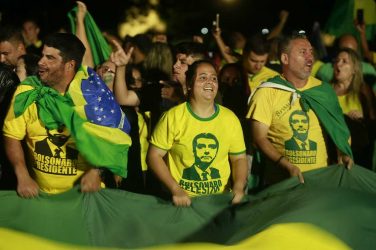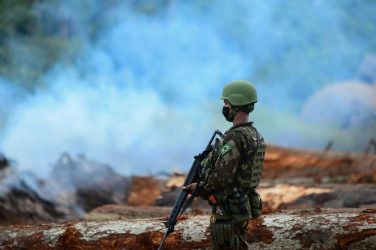And the winner is… Nicolas Maduro. At the end of 2017, the president of crisis-ridden Venezuela is emerging as the clear victor, not only in the power struggle in his own country but also compared to most other heads of state in Latin America.
His popularity ratings are now higher than those of the Nobel Peace Prize winner Juan Manuel Santos, in neighboring Colombia. The Venezuelan parliament has been disempowered, the separation of powers abolished in favor of a hand-picked, all-powerful “Constituent Assembly,” and the opposition is divided.
Maduro has moved well beyond mere populism; he no longer needs to worry about re-election in 2018.
Just as in Cuba Raul Castro has no need to worry about threats to his family’s Communist legacy once he steps down as president. Everything in Cuba will continue along the same socialist path.
The Communist party has everything under control, and since Donald Trump came to power, there has no longer been any prospect of change through rapprochement with the United States.
In Colombia, though, Santos’ legacy is a fragile one. His peace process is very behind schedule, and many Colombians who were hoping for a quick, noticeable “peace dividend” are disappointed.
The political involvement of former guerrillas, and the comparatively mild penalties imposed by the transitional justice system are highly controversial, and the opposition has no qualms in spreading terrible rumors.
The parliamentary elections in March may shift the balance of power, making the peace process more difficult, or perhaps even reversing it. Santos cannot stand again in the presidential election in May; there will have to be a run-off to decide who will follow him.
The populist polemic against the peace agreement will certainly determine the election, and it remains to be seen to what extent Santos’ successor will want to, or be able to, implement the agreement.
Corruption in Brazil opens the door to a right-wing populist
Populism itself could be the big winner in 2018. Everywhere, endless waves of corruption scandals have destroyed people’s confidence in politics without strengthening their trust in the constitutional state.
In Latin America’s two largest national economies, Brazil and Mexico, corruption is also discrediting efforts to implement a more sustainable economic policy that emphasizes self-supporting growth rather than redistribution.
Given the disastrous crisis of confidence in Brazil, what the country really needs first, before it holds elections, is a fundamental reform of the political system.
Since the very contentious impeachment of former president Dilma Rousseff, the political camps have become even more entrenched in their positions. Corruption investigations at the highest level have brought all the major parties into disrepute.
President Michel Temer is the most unpopular head of state in the world, with approval ratings that barely scrape five percent. The only politician who still enjoys a good reputation – among his party faithful at least – is the legendary Lula da Silva. However, he probably won’t be allowed to stand as he too is facing corruption charges.
And so it is that the complex, patronage-based Brazilian party system has put Jair Bolsonaro, an unappetizing right-wing populist, homophobic racist and declared supporter of the former military dictatorship, in second place in the opinion polls, right behind former president Lula.
Good chances for left-wing populism in Mexico
In Mexico, dissatisfaction with the current president, Enrique Pena Nieto, as well as rampant corruption and impunity for countless murders and other capital offences have favored a left-wing populist. Andres Manuel Lopez Obrador, referred to as AMLO, has stood for the presidency twice before without success.
This time, though, his chances are good. After all, he’s standing against a rather implausible alliance of the Christian and Social Democrats with the grassroots movement on the one hand, and on the other against the former Foreign and Finance Minister Jose Antonio Meade, the candidate for the PRI party, which usually holds the presidential office.
Many voters will probably hold Meade responsible for the shambles that is all that remains of Pena Nieto’s ambitious 2012 “Pact for Mexico” that was supposed to make the economy and the political system more democratic, as well as expand social rights.
No economic or environmental progress can mask the brutal daily violence that continues to go unpunished in Mexico. However, it is questionable whether distributional policy without economic growth would improve the situation.
The elections in Costa Rica and Paraguay will have less impact on the development of Latin America. However, they could contribute something to stability in the region, rather than leaving this to the dictatorships in Cuba and Venezuela.
Uta Thofern is the DW’s head of Latin America.






